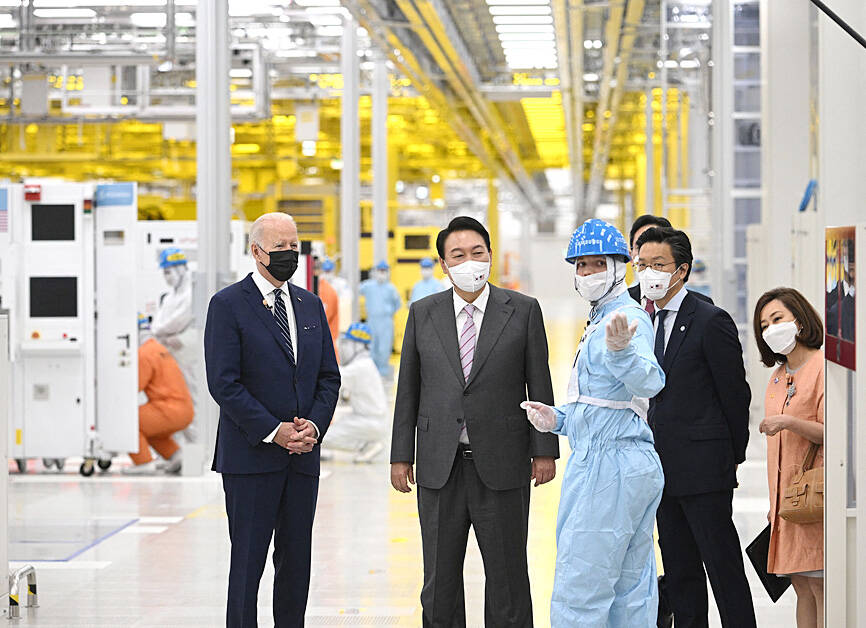The US is asking South Korea to adopt restrictions on semiconductor technology exports to China similar to those Washington has already implemented, another sign that US President Joe Biden’s administration is stepping up efforts to thwart Beijing’s chip ambitions.
US officials want South Korea to restrict the flow of equipment and technologies for making high-end logic and memory chips to China, people familiar with the matter said.
Those include logic chips more advanced than 14-nanometer technology and DRAM beyond 18-nanometers, one of the people said, asking not to be identified because the discussions are private.

Photo: AFP
That would be consistent with a set of measures the US Department of Commerce first announced in 2022.
US officials discussed the issues in depth with the government of South Korean President Yoon Suk-yeol last month, the people said.
While the US is trying to reach an agreement before a G7 summit in the middle of June, South Korean officials are debating whether to satisfy the US request, in part because China remains a key trading partner.
Washington’s request of Seoul has not been detailed before. This comes on top of the new US push to get allies to limit servicing of semiconductor equipment for Chinese firms and restrict exports of spare parts and chip chemicals to China.
Bloomberg News has reported the US pressed allies, including South Korea and Germany, to tighten curbs on China’s access to their technology.
South Korea plays a leading role in producing semiconductors and providing spare parts for chipmaking equipment.
The timeline could slip. South Korea, Japan and US officials are planning to meet in late June to discuss cooperation on advanced technology and supply chains, the sources said.
South Korean officials are wary of potential penalties that export controls might trigger from Beijing when major firms such as Samsung Electronics Co and SK Hynix Inc still operate in China, Seoul’s largest trading partner.
With help from Samsung and Hynix, South Korea makes some of the world’s most advanced logic and memory chips. While its chip equipment suppliers are not as prominent as the US’ Applied Materials Inc or the Netherlands’ ASML Holding NV, local gear makers including Hanmi Semiconductor Co and Jusung Engineering Co still make up an important part of the Asian country’s semiconductor ecosystem.

South Korea’s equity benchmark yesterday crossed a new milestone just a month after surpassing the once-unthinkable 5,000 mark as surging global memory demand powers the country’s biggest chipmakers. The KOSPI advanced as much as 2.6 percent to a record 6,123, with Samsung Electronics Co and SK Hynix Inc each gaining more than 2 percent. With the benchmark now up 45 percent this year, South Korea’s stock market capitalization has also moved past France’s, following last month’s overtaking of Germany’s. Long overlooked by foreign funds, despite being undervalued, South Korean stocks have now emerged as clear winners in the global market. The so-called “artificial intelligence

NEW IDENTITY: Known for its software, India has expanded into hardware, with its semiconductor industry growing from US$38bn in 2023 to US$45bn to US$50bn India on Saturday inaugurated its first semiconductor assembly and test facility, a milestone in the government’s push to reduce dependence on foreign chipmakers and stake a claim in a sector dominated by China. Indian Prime Minister Narendra Modi opened US firm Micron Technology Inc’s semiconductor assembly, test and packaging unit in his home state of Gujarat, hailing the “dawn of a new era” for India’s technology ambitions. “When young Indians look back in the future, they will see this decade as the turning point in our tech future,” Modi told the event, which was broadcast on his YouTube channel. The plant would convert

‘SEISMIC SHIFT’: The researcher forecast there would be about 1.1 billion mobile shipments this year, down from 1.26 billion the prior year and erasing years of gains The global smartphone market is expected to contract 12.9 percent this year due to the unprecedented memorychip shortage, marking “a crisis like no other,” researcher International Data Corp (IDC) said. The new forecast, a dramatic revision down from earlier estimates, gives the latest accounting of the ongoing memory crunch that is affecting every corner of the electronics industry. The demand for advanced memory to power artificial intelligence (AI) tasks has drained global supply until well into next year and jeopardizes the business model of many smartphone makers. IDC forecast about 1.1 billion mobile shipments this year, down from 1.26 billion the prior

People stand in a Pokemon store in Tokyo on Thursday. One of the world highest-grossing franchises is celebrated its 30th anniversary yesterday.